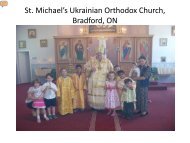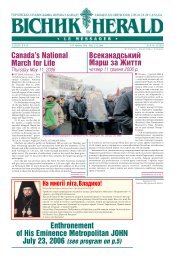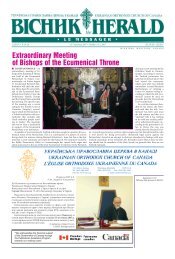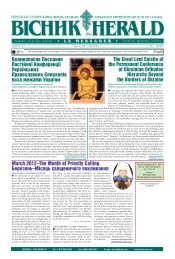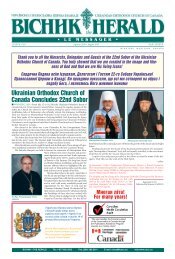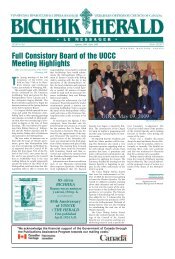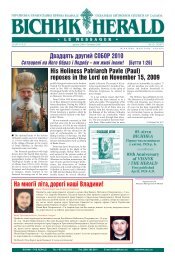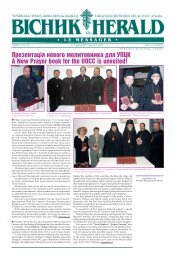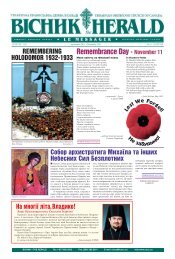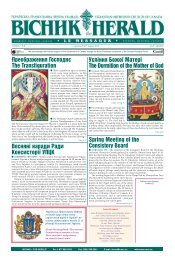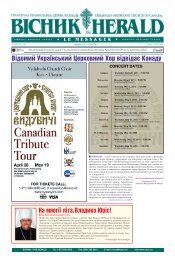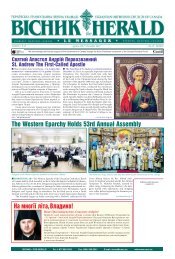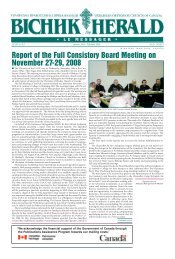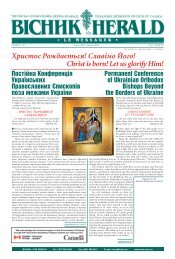12 ВІСНИК1/<strong>15</strong> липня 2007You Wanted to KnowQUESTION: Father, why are peoplestruggling with the topic <strong>of</strong> good and eviltoday?ANSWER: The question <strong>of</strong> good versusevil and the recognition <strong>of</strong> each inour North American Societal experiencecan be narrowed to a difference inperception <strong>of</strong> good and evil today.Everything is perception, especiallywhen it comes to topics <strong>of</strong> the heart,topics <strong>of</strong> morality and topics <strong>of</strong> thestruggle between understanding thetruth <strong>of</strong> what is good and evil in ourworld. Our material being will seekmaterial satisfaction and material sustenance,however, the spiritual is sustainedand attracted to that which neitherhas form nor colour. It is easier todifferentiate between what is good andevil in our material world since we arewell versed in the material.We know that smoking and drugscan kill us. We know that physical traumaand fire can be dangerous. We understandthat war, kidnapping and torturefor political gain is an evil thing.These are quite recognizable to the eye.However, an "untended human soul"may perceive that the use <strong>of</strong> thesethings or the engaging <strong>of</strong> the above forpleasure or personal gain is not wrong.This is not to say that the person engagedin these activities is ignorant tothe ills that are being caused or the evilthat ripples from immoral activity, it isto say that the physical is tended to andthe spiritual ignored. An "untended humansoul" will drift toward satisfactionWith thoughts <strong>of</strong> (hopefully)sunny summer weather, holidaysand excursions withfamily and friends it's easyfor one to pack matters <strong>of</strong> faith andchurch backaway for a while. Often weprefer to take these things out again toconsider them when autumn approaches.The cycles <strong>of</strong> fasting, holydays and services continues throughoutthe year! Do not neglect to care forthe soul during these summer months.The gentler weather and many thingsto do can distract us from our journeytoward salvation and life with Christ.There are three primary Holy Daysthat <strong>Orthodox</strong> celebrate during thesummer months. The feast day <strong>of</strong>Saints Peter and Paul falls this year onin the material exclusively but a "spirituallypracticed soul" can become redirectedto spiritual knowledge and understanding.Here is where the <strong>Church</strong>enters our lives to give such understandingand direction.Each person, at some point in life, willcome against a brick wall. There may bea spiritual or physical crisis which ignitesquestions <strong>of</strong> purpose, direction, selfworth, judgment <strong>of</strong> others and finally,one's own mortality. This type <strong>of</strong> questioningand search will begin to engagethe individual to seriously look at theirlife and frame it into perceived truths.Each person's perceived truths will havecategories <strong>of</strong> what is evil and what isgood in his/her life.Consciously or unconsciously, thatperson will begin to judge and categorizeeverything that they are engagedin, whether good or evil, and surmise aplan <strong>of</strong> attack which will then be theirpath; their direction for their life. Thoseseriously looking for direction andhelp to escape the deep pit <strong>of</strong> depressionor hopelessness or release fromtheir pride, built out <strong>of</strong> their eagernessto achieve all goals on their ownstrength, will find full sustenance inJesus Christ!The Holy <strong>Church</strong> provides a totalframework <strong>of</strong> truth, direction andspiritual food for the development andgrowth <strong>of</strong> the individual out <strong>of</strong> the realm<strong>of</strong> physical struggle to the dimension<strong>of</strong> spiritual struggle. Throughpractice <strong>of</strong> all <strong>of</strong> the guidelines, worship,dogma, teaching, tradition, orderOur Faithand obedience that exists in the life <strong>of</strong><strong>Orthodox</strong>y today, a person can be ledto redirect the journey <strong>of</strong> his or her lifeto eternally understanding and recognizingthe difference between goodand evil. This new ability, found inhumility and based in obedience to theultimate and unconditional practice <strong>of</strong>the love <strong>of</strong> Christ, will open one's spiritualeyes to fully perceiving what isgood and evil.It is interesting that the <strong>Church</strong> callsall living Christians "Militant" since weare the ones constantly engaged instruggle and spiritual practice for oursouls' growth towards God-likeness.Seeking a life <strong>of</strong> humility and thepeace, that is obtained from obedienceto love, needs constant tending and direction.For this reason, the <strong>Church</strong> hasSpiritual Fathers who are called to thevocation <strong>of</strong> leading their flock to Christ.Every Bishop and Presbyter, every SpiritualFather, provides his spiritual childrenwith the love and direction neededfor growth and enlightenment. This isdone only in conjunction with theGrace <strong>of</strong> the Holy Spirit. The Bishopand Presbyter love each <strong>of</strong> his childrenand gives his life for his children so thatthey are able to grow and mature as<strong>Orthodox</strong> Christians in Christ.The ability <strong>of</strong> any person to submitto the loving guidance <strong>of</strong> a SpiritualFather can be a difficult task, sincemost people wish to enter this journey<strong>of</strong> understanding Christ, alone. This isimpossible. Each <strong>of</strong> us must have aSpiritual Father who will lead us, guideRemembering God during the summerCalgaryReal EstateColdwell BankerNESTORPAPISH B.Sc.ResidentialRuralCommercialRealtorCalgary, AB<strong>Canada</strong>100% Club, Executive ClubAgent / MLS RealtorToll free:1-877-560-1499e-mail:nestorpapish@hotmail.comor npapish@shaw.caThursday July 12. The feast day is precededby a fasting period that beginsjust after Pentecost. During this"Apostles' Fast" we are called upon toemulate the 12 by living and proclaimingthe message <strong>of</strong> the Gospel. We cando this by attending church, and invitingand bringing others with us toshare in the Holy Liturgy. The messageto "Go forth" from our Lord did notend with the twelve, but carries on tothis very day with each <strong>of</strong> us. Ourchurch, our parish need YOU to answerthis call and be sure that each andevery service is well attended.On Sunday August 19, the churchcelebrates the Transfiguration <strong>of</strong> OurLord. This is one <strong>of</strong> the twelve MajorFeast Days in the yearly church cycle.At the conclusion <strong>of</strong> the TransfigurationLiturgy, the priest will bless thefirst-fruits, which are brought by thefaithful. The blessed fruit is a reminderto us <strong>of</strong> the many blessings and richnessThe Lord bestows upon us eachday. It reminds us <strong>of</strong> the sweetnesswaiting for us in the next life withChrist. It also serves to remind us to begood and vigilant tenders to God'svineyard, for each <strong>of</strong> us will answer forhow "good and faithful" a servant wewere in this life.Finally, on Tuesday August 28 thechurch celebrates the Dormition <strong>of</strong> theMost Holy Theotokos. It is preceded bya 14-day fasting period. This is one <strong>of</strong>the major feast days <strong>of</strong> The Mother <strong>of</strong>God. The church reminds us duringthis time to learn from our Lady's dedication,humility, courage and especiallyher compassion. This is an excellenttime to reach out to visit people we <strong>of</strong>tenforget during the summer months.Is there a forgotten aunt or uncle, cousin,in-law or other church or familymember you haven't seen in a while?This is a good time to arrange for anice summer walk, a visit to a park orus, answer questions, share wisdom,praise us seldom and scold us <strong>of</strong>ten, sothat we are able to discern first handwhat is evil and what is good. Thusrecognizing what is truly evil and whatis truly good in our experience movesthen, from the realm perception to that<strong>of</strong> clear knowledge.Our world is full <strong>of</strong> subtle snares:pride, arrogance, hate, deception, powerand verbal murder, which have seducedus into accepting them as normalor good. There is not much goodin the romance <strong>of</strong> "dancing with thedevil" when our souls could be at stake!Making a conscious effort to decide t<strong>of</strong>ollow Christ is key to winning thestruggle <strong>of</strong> achieving the true knowledge<strong>of</strong> good and evil.After leaving all that is evil and allthat is material behind for the benefit<strong>of</strong> all that is good and unseen, we willbe given our eternal gift.The choice is yours and the decisionto enter the struggle for knowledgemust be yours. Remember, ignoranceis not bliss!I bid you peace from this day forward.concert or other venture for the peopleso <strong>of</strong>ten overlooked. Do not forget thatJesus reminds us in Matthew chapter25 that "in that you have done this tothe least <strong>of</strong> these, my brethren, you didit to Me."My prayers are with all <strong>of</strong> you duringyour many journeys and adventuresthis summer season. Do not letyour faith get hidden. Do not just packit away with the winter sweaters andrain coats. Let your light shine beforeall people in this bright summer, sothat they may see your good deeds andpraise your Father in heaven.Липень: Народні звичаї i прикмeти■ Свято народження Іоанна Хрестителяв народі співпадає з купальським.Дівчата і хлопці виходять увечорі за село, водять хороводи на березірічки, плетуть вінки і пускаютьїх разом із свічкою на воду. Вважається,що золотисті вогники, щопливуть в темряві по річні, віщуютьдівочу долю. У ніч на Івана Купаламолодь шукала у лісі цвіт папороті.Наші предки мало знали про цюрослину і вважали, що вона квітнеодну ніч. Хто знайде—буде щасливийвсе життя. День відсічення ГоловиСвятого Пророка Предтечі в народіназивали Головосіка. Віруючі людив цей день не варили борщу, і навітьхліб нарізали заздалегідь, аби небрати до рук ножа.У липні церква святкує народженняПророка Предтечі і ХрестителяГосподнього Іоанна, день святихПервоверховних апостолів Петра іПавла, віддає шану в молитві всімReverendFr. Brent Kuzyk,Presbyter,Descent <strong>of</strong> theHoly Ghost,Regina, SKReverendFr. Charles BaxterSaint GeorgeParish in Victoria, BC& St. Marythe Protectressmissionin Parksville, BCсвятим землі української, святимрівноапостольним князям київськимВолодимиру і Ользі, преподобномуАнтонію Києво-Печерському.Іоанн Хреститель народився неподаліквід Єрусалима, в містечкуЮтта. Його батько Захарія був юдейськимсвящеником, а мати— Єлизавета—дочкарідної сестри св. Ганни,матері Пресвятої Богородиці.(продовження на стор.13)
THE HERALDJuly 1/<strong>15</strong>, 2007Our Faith“Let all the Children Come to Me”Very little has been written aboutchildren or even adults with disabilitiesand their spiritual development.Some <strong>of</strong> what has beenwritten suggests that spirituality is notnecessarily dependent upon intellect.This past fall, I had had the opportunityto visit my Alma Mater in Texas,where I spoke to a former educationpr<strong>of</strong>essor, Dr. Jerry Whitworth, whohanded me his newly co-authoredbook, "Let All the Children Come toMe." I was blessed to see this book, asthese authors researched a biblicallybased guide for the understanding <strong>of</strong>the <strong>of</strong>ten-unmet needs <strong>of</strong> the challengedchildren who attend churchwith their families, as well as those whodo not attend because many churchesare not equipped to effectively ministerto them. In their research they havesuggested that the spirituality <strong>of</strong> thosedisabled may be an intrinsic or naturalfeature <strong>of</strong> the human condition whichmany <strong>of</strong> us do not even understand.Having a family member with a disability,watching my aunt in her chosenvocation <strong>of</strong> administering to the quality<strong>of</strong> life <strong>of</strong> over forty adults with disabilitiesand knowing five adults in myparish district, who face those samechallenges, prompted me to write <strong>of</strong>the experiences in ministering to themand sharing with you their relationshipwith God and the church. Their actionsare unique and I have changed theirnames to ensure their privacy. I willfurther use the word child(ren) but theword will also represent those adult(s)with limitations.á‡Á‰‡Î„¥‰¸ Á‡Ô·ÌÓ‚‡Ì¥ ÔÓıÓappleÓÌËЗазадалегідь запланований похорон—це можливо найкраща послуга,що можете зробити для своєї родини чи близьких. Нині багатолюдей усвідомлюють, що планування похорону заздалегідь зменшуєі полегшує цей тягар. Таке планування забезпечує спокій, заощаджуєвидатки і запевняє прийняття рішень без стресу чи натиску часу.За інформацією чи для обговорення планування заздалегідь похорону,звертайтеся, будь ласка, до Володимира Ядловського, директорапохоронного заведення Park Memorial.Prearranged FuneralsPre-planning your funeral could be the kindest thing you do foryour family. Today more people are recognizing that planning a funeral inadvance lessens the burden for those you love. It provides peace <strong>of</strong> mindby saving money and ensuring decisions are madewithout stress or time pressure.For information or to discuss prearranginga funeral, please contact Walter Yadlowski at ParkMemorial.Walter YadlowskiFuneral DirectorThe word "handicap" originated longago when people with disabilities wereforced to beg on street corners. It haseven been reported that some parentswould purposely break their children'slegs so they would be disabled, generatepity, and get more and larger contributions.These individuals would hold outtheir caps to passer-by in the hope <strong>of</strong>receiving money. This "cap in the hand"practice came to be known as "handicap".This reflects a pervasive attitudethat people with disabilities should beviewed as objects <strong>of</strong> pity— needing ourcharity, rather than people entitled tothe same opportunities for employment,education and other "quality <strong>of</strong>life" rights, as the rest <strong>of</strong> society.This has <strong>of</strong>ten resulted in a form <strong>of</strong>discrimination known as "handicappism".An "ism" is what results whenwe believe that a label carries with it aset <strong>of</strong> characteristics.Once a label is placed on a personthat person also gets all <strong>of</strong> the characteristicsthat go with that label. Theperson becomes identified by his or herlabel. Whether or not all <strong>of</strong> those characteristicsapply to the individual isimmaterial. Society automatically assumescertain things about the individualbecause <strong>of</strong> the label he or she wears.Thus, we have ageism, racism andhandicappism.As a result, rather than the disabilitybeing one feature <strong>of</strong> a person, it isviewed by society as defining everythingabout that person. The individualis confined and limited by the label.We assume certain things about them9709-111 Avenue,Edmonton, Alberta, T5G 0B2Phone (780) 426-0050Fax (780) 424-2405Toll Free 1-800- 822-3526because <strong>of</strong> their label, and we as members<strong>of</strong> the church place limitationsand restrictions on them as a result <strong>of</strong>that label.This can be seen in the terminologythat we use to refer to a person with adisability. We say "a blind man" cannothelp at the brotherhood fundraiser becausehe cannot count money, or amentally retarded woman or a disabledboy cannot be <strong>of</strong> any assistance inchurch. In other words, the disability isseen first and then the person. We thenhave forgotten the words <strong>of</strong> EvangelistJohn. We allow the disability to shapeour perceptions <strong>of</strong> who and what thatperson is. We place restrictions andlimits on him or her because <strong>of</strong> the disability.We may think, 'poor retardedBen'. 'Retarded' people cannot do thisin church, so Ben cannot serve in theSanctuary. This attitude causes us tonever really give Ben a chance to demonstratewhat he can do.In reality, all <strong>of</strong> us are different inone way or another. Most <strong>of</strong> us wouldresent having just one <strong>of</strong> our characteristicsused to define everythingabout us. To define a person and limithim or her by one characteristic, especiallyif that characteristic is a disability,is to shut that person <strong>of</strong>f from societyand to deny the potential he or shemight possess. Worse yet, it deprivesthe rest <strong>of</strong> us from knowing that person,forming a relationship with them,and benefiting from what he or she hasto <strong>of</strong>fer and to contribute to ourchurch community.People with disabilities have personalities,strengths, needs and differencesjust like all <strong>of</strong> us. They are people in ourchurch community with skills, abilities,personalities and frailties, no differentthan anyone else in our society. Thatdiversity is one <strong>of</strong> our society's greateststrengths. It should be celebrated andappreciated. There are numerous examples<strong>of</strong> individuals with very debilitatingdisabilities who made enormouscontributions to our society and to oursociety and to the quality <strong>of</strong> life on thisplanet: Helen Keller and Ludwig vonBeethoven are obvious examples. Wealso find examples in the Scriptures <strong>of</strong>people with limitations, or disabilities,who were used by God for great andnoble purposes. Moses was not a goodspeaker; St. Paul apparently had a visualproblem; Zacchaeus was small in stature;and Bartimaeus, though blind(продовження зі стор.12)ReverendFr. PatrickPowalinskyHyas-Kamsack-Swan RiverParish District13exhibited great faith.All too <strong>of</strong>ten we assume that a childmust express his or her knowledge <strong>of</strong>our faith in order to have a spiritual relationshipwith God. Reciting the passages<strong>of</strong> Scripture during a prayer,reading historical events and memorizingthe hymns are all examples <strong>of</strong> achild's cognition. For many <strong>of</strong> us, theexpectation is that our children mustdemonstrate a certain level <strong>of</strong> cognitionbefore we accept that a relationshipwith God is possible.But what about the child or adultwho can't read? What about the childwho cannot attend a Bible study because<strong>of</strong> circumstance? What about thechild who does not speak or hear orfully comprehend a message? Must thesechildren demonstrate the same levels<strong>of</strong> cognition in order to have a relationshipwith God? Is it possible, in otherwords, for Ann to understand God'slove if she has not memorized the books<strong>of</strong> the Bible and points to them with asmile on her face? Yes. Does that meanthat I should not expect Ann to everlearn a scripture verse <strong>of</strong> the Bible? No.But it is important to remember thatAnn may or may not learn them—butthe good news is she does not have to inorder to grow in the love <strong>of</strong> the Lord.A few weeks ago, we stood to singthe glorious hymn <strong>of</strong> "Christ is Risen",and on this day I felt especially inspiredas my own voice was overshadowed bya beautiful voice from behind me. I wasso taken by the sound <strong>of</strong> this man'svoice lifting up the words we weretaught to proclaim more than 2,000years ago 'Christ is Risen...', that I becamesilent so I could hear him singthe hymn with so much energy. As weended our blessing and took our seatsat the Paschal breakfast, I looked overmy shoulder. What I saw made metearful. Behind me stood Anton, all full<strong>of</strong> happiness and exclaiming the fundamentaltruth <strong>of</strong> the church with thegreeting, 'Christ is Risen, Indeed He isRisen' in our mother tongue. This wasa blessing to me!(to be continued)Праведні перед Богом, ці люди достарості не мали дітей, бо жона непліднабула. Одного разу під час кадінняв Божому храмі, коли безлічнароду молилoся, знадвору явивсядо Захарії Ангел Господній Гавриїл.Він сповістив наляканому священику,що Всевишній почув його молитву—дружина Єлисавета сина породить.Велів назвати його Іоанном босин той стане на втіху Захарію і всімлюдям, і буде він великим у Господа,''ні вина, ні п'яного напою не питиме,а ще в утробі матері Святим Духомнаповниться".Не повірив Захарія, бо старийуже був і дружина немічна. За цеАнгел позбавив мови його до тогодня, поки народився Іоанн. Ховаючисьвід слугів царя Ірода, котрі вбивалималих дітей, Єлисавета пішла здитям в пустелю. Лише через тридцятьроків повернувся Іоанн в Йордані підготував людей своєю проповіддюдо приходу Спасителя. ПісляХрещення Ісуса Іоанн Хрестительпродовжував проповідуватинароду смирення й покаяння. ЦарІрод дуже боявся Славного Пророка,особливо після того, як той засудивйого прилюдно за те, що оженивсяна братовій вдові з дитиною.Він наказав кинути до в'язниці Іоанна.Під час бенкету дочка дружиниІрода забажала, аби цар Ірод подарувавїй на тарілці голову ПредтечіХреститиля. Слуги виконали цю забаганку.Після цього царя Ірода, йогородину і військо спіткала велика біда.Голова Іоанна Хрестителя булаперевезена в Константинополь і покладенав дворецькій церкві.
- Page 1: LXXXIV • Ч.13-14 1/15 липня
- Page 4 and 5: The View from the Chair4 ВІСНИ
- Page 7 and 8: THE HERALDJuly 1/15, 2007Весня
- Page 9 and 10: THE HERALDJuly 1/15, 20079Мона
- Page 11: THE HERALDJuly 1/15, 2007Travelogue
- Page 15 and 16: THE HERALDJuly 1/15, 2007St. Elia C
- Page 17 and 18: THE HERALDJuly 1/15, 2007From the O
- Page 19 and 20: THE HERALDJuly 1/15, 2007Donations
- Page 21 and 22: THE HERALDJuly 1/15, 2007For Our Ch
- Page 23 and 24: THE HERALDJuly 1/15, 2007Що та
- Page 25 and 26: THE HERALDJuly 1/15, 2007■ Діл
- Page 27 and 28: THE HERALDJuly 1/15, 2007July - Sch



